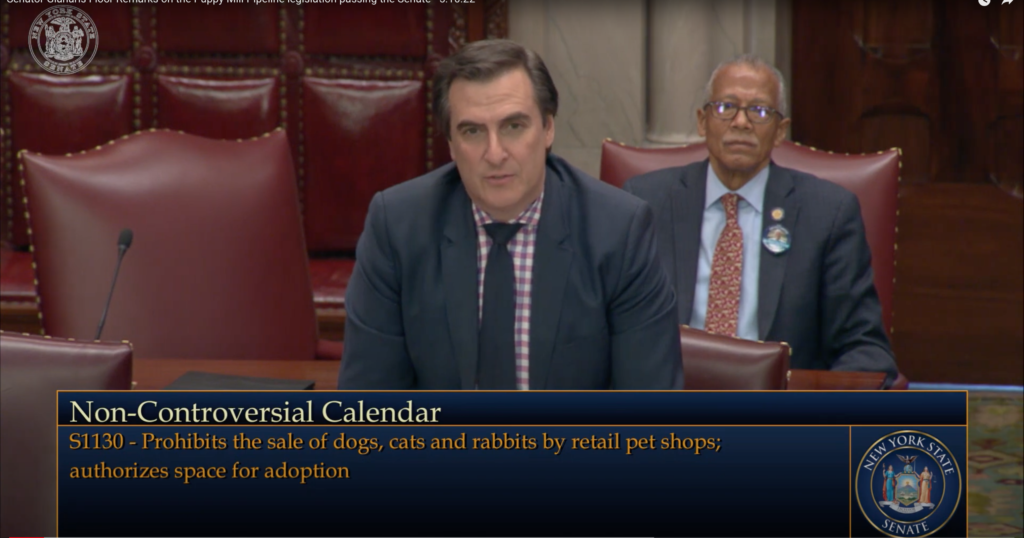The retail sale of puppies, kittens and rabbits will be barred from New York pet stores once the puppy mill pipeline bill becomes law with Governor Kathy Hochul’s signature.
Legislation supported by Senate Deputy Leader Michael Gianaris and Assemblymember Linda B. Rosenthal, aims to end the puppy mill to pet store pipeline in New York State, where out-of-state and often inhumane commercial breeding facilities supply stores with different breeds of pets.
A 134-15 vote in the State Assembly last Friday places the bill on the governor’s desk, waiting to be signed.
“With so many good animals in need of rescue, there is no need for abusive puppy mills to supply pet stores,” Senate Deputy Leader Michael Gianaris said. “Our four-legged companions should be treated with respect, not like commodities. I am proud to have authored this important bill and thrilled to see it pass the Legislature. And now I am hopeful Governor Hochul will sign it into law.”
The bill comes with the backing of The American Society for the Prevention of Cruelty to Animals, the Humane Society of New York State, New York State Animal Protection Federation, Voters for Animal Rights and the New York City Bar Association Animal Welfare section.
Oftentimes, offspring of mill animals have congenital issues resulting from poor breeding and can cost families thousands of dollars in veterinary care.
According to the New York State Department of Agriculture and Markets, the state agency tasked with regulating pet dealers, there are approximately 80 pet stores licensed throughout the state.
“Puppy mills breed cruelty. Banning the sale of dogs, cats and rabbits in New York pet stores will deal with puppy mill-to-pet store pipeline a near-mortal blow,” Assemblywoman Linda B. Rosenthal said. “The cute puppies, kittens and bunnies in pet store windows mask a sad reality: these animals are products of horrific neglect in puppy mills. Puppy, kitty and bunny mills use and abuse animals to churn out pets for sale, which are often riddled with congenital diseases that cost unsuspecting consumers hundreds or thousands of dollars in veterinary bills and incalculable emotional stress. Over the years we have tried to regulate pet stores, but the industry continues to prioritize profits over the welfare of animals. My work with State Senate Deputy Leader Michael Gianaris and the advocates will help shut down the pet store-to-puppy mill pipeline once and for all.”
Pet breeders and stores are loosely regulated under the Animal Welfare Act by the U.S. Department of Agriculture.
In Iowa, Daniel Gingerich was licensed by the USDA in 2019, however the agency didn’t inspect the facility until 2021. Upon inspection, the agency found dead and dying dogs, dogs hidden from inspectors, ongoing disease outbreaks, heat distress, lack of water and food –– totaling up to 190 violations.
Based on veterinarian inspection documents filed with New York State, dogs were sold to over 25 locations in New York, including to Astoria Pets in Astoria and to HeyPets Inc in Flushing. Different breeds of dogs were also sold to a number of locations in Brooklyn and the Bronx.
In a blog written by ASPCA President and CEO Matt Bershadker, he says the nonprofit has helped rescue over 500 dogs living in conditions at multiple Iowa properties operated by Gingerich.
He also pointed to public documents that show more than one-third of New York’s puppy-selling pet stores, including shops in Queens, Brooklyn, the Bronx, Westchester and Long Island, imported Gingerich’s puppies.
“Once signed into law, the puppy mill pipeline bill will finally end the sale of cruelly bred puppy mill dogs in pet shops across New York state, which has one of the country’s highest concentrations of pet stores that sell puppies,” Bershadker said. “Shutting down the puppy mill pipeline will help stop retail sellers and commercial breeders from engaging in—and profiting from—unconscionable brutality. We’re grateful to Assembly Member Rosenthal and Senator Gianaris for championing the passage of the Puppy Mill Pipeline Bill and urge Governor Hochul to sign it to signal New York’s determination to reject animal cruelty statewide.”
In March, Gingerich reached a plea agreement, pleading guilty to one count of animal neglect with serious injury or death, and another count of animal neglect with serious injury. Gingerich was sentenced to 30 days in jail and two years of probation.
The legislation also allows for pet stores to collaborate with animal rescue organizations to keep ethical pet adoptions a part of the industry.
Speaking on the State Senate floor last month, Gianaris said stopping the flow of puppy mill pets will not interrupt business for the approximately 80 pet stores throughout the state.
“It’s time to put that part of the industry to rest,” he said. “Ninety eight percent of pet store business is not from selling animals. It’s from selling products, supplies and food. We’re not destroying an industry, we’re saving lives.”



